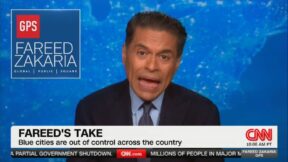Spectator Chair Andrew Neil Vows to Quit If ‘Absurd’ Jeff Zucker Buy-Over Goes Ahead
The Spectator’s chairman Andrew Neil will quit his role if the “absurd” purchase bid for the magazine by ex-CNN chief Jeff Zucker’s Abu Dhabi-backed investment group goes ahead.
Zucker’s RedBird IMI announced in November it had reached a deal with current owners the Barclay family to acquire the Daily Telegraph and The Spectator by settling debts with Lloyds Banking Group.
Appearing on BBC Newsnight Thursday, Neil slammed the prospect of titles falling under the control of a “dictatorship,” highlighting the UAE’s authoritarian regime.
“My main concern is that the people bankrolling this are the UAE, the United Arab Emirates,” he told host Victoria Derbyshire. “They are a government, and the idea that government should own newspapers and magazines in Britain I think is absurd.”
He continued: “But they are not just a government, they are an undemocratic government — they are a dictatorship. The UAE is a terribly successful place — I have done business there — but it is not a democratic government. We are a democracy, our publications are part of the democratic process. How could we be owned by an undemocratic government?”
The chairman ripped Zucker, who he said lacked an understanding of British media dynamics, despite being a “very impressive broadcasting executive.”
Neil said: “[Zucker] knows nothing about Britain, he knows nothing about print, he knows nothing about newspapers, and he knows nothing about magazines”.
He added: “The idea that these two vital vehicles of mainstream centre-right thought, the Telegraph and Spectator, should be owned by Arab money and controlled out of New York by a left-wing Democrat beggars belief.”
“If RedBird take it over, I’ll be gone,” Neil said.
Despite Zucker’s vow to protect “editorial independence” should he succeed, Culture Secretary Lucy Frazer issued a Public Interest Intervention Notice (PIIN), prompting investigations by Ofcom and the Competition and Markets Authority (CMA) into the deal’s implications for press freedom.
New: The Mediaite One-Sheet "Newsletter of Newsletters"
Your daily summary and analysis of what the many, many media newsletters are saying and reporting. Subscribe now!






Comments
↓ Scroll down for comments ↓